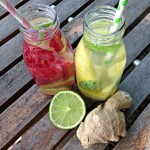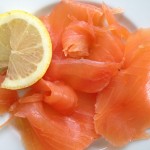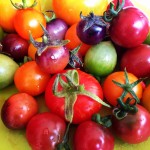How to keep the kids healthy and focused at school is easier said than done. After just a week back, my children are drinking less fluid than they have all summer, they’re starving when they come out of school and kids are already sneezing on the way in. Dehydration, hunger and exposure to bugs? Not a promising start.
It’s important to address this so we can reach half term without days off, but it does involve (being honest here) a little bit of advance planning. So we’ve put together these Back to School Nutrition Tips so that the kids remain well nourished, focused at school and sniffle-free.
1. Breakfast Well
Many kids regularly go to school without breakfast – a study in 2010 found that only 68% eat breakfast before school every day. I’m definitely not a morning person but there are good reasons to drag myself out of bed 10 minutes earlier to make everyone a quick, nutritious breakfast (and no, cocoa pops and toast don’t count).
 Breakfast is really important, especially for kids. Good research shows that children who skip breakfast are less fit, less active and more likely to be overweight or obese. Around 25% of UK children are overweight or obese; for body-conscious teenagers this can be a simple incentive to motivate them to eat before school. It’s also well known that a nutritious breakfast that helps to support balanced blood sugar levels results in better focus, concentration and energy during the morning. This should lead to knock-on effects in learning, behaviour and performance at school – a big plus for me at parents evening. Check out our breakfast category for quick and easy ideas – porridge or eggs are great options as we move into colder autumn mornings.
Breakfast is really important, especially for kids. Good research shows that children who skip breakfast are less fit, less active and more likely to be overweight or obese. Around 25% of UK children are overweight or obese; for body-conscious teenagers this can be a simple incentive to motivate them to eat before school. It’s also well known that a nutritious breakfast that helps to support balanced blood sugar levels results in better focus, concentration and energy during the morning. This should lead to knock-on effects in learning, behaviour and performance at school – a big plus for me at parents evening. Check out our breakfast category for quick and easy ideas – porridge or eggs are great options as we move into colder autumn mornings.
2. Drink Well
In the holidays kids glug drinks whenever they want. At school there are restrictions – water bottles aren’t always kept on desks and there appear to be bizarre ‘designated drinking’ times. The result is that the amount of water our kids drink during the day easily halves.
 The impact? Drinking water helps physical and mental performance so it’s just mad if kids don’t have ready access to water when they feel like it during the day. Kids that take water into exams perform better – just 1% dehydration can lead to reduced concentration.
The impact? Drinking water helps physical and mental performance so it’s just mad if kids don’t have ready access to water when they feel like it during the day. Kids that take water into exams perform better – just 1% dehydration can lead to reduced concentration.
If they’re not drinking at school, it’s important to get fluids in before and after school. Water makes up the bulk of this (take a look at our infused water ideas if your kids don’t like ‘plain’) but at breakfast we often have 100-150mls portion of a fresh smoothie, a cup of warm high antioxidant cherry or blueberry cordial and a mug of hot chocolate after school. All of these drinks contain antioxidants, great for immune health; cocoa and blueberries are also fab for memory.
3. Eat Oily Fish
Making sure that the kids eat 1-2 portions of oily fish (e.g. salmon, sardines, mackerel) a week boosts their intake of Omega 3 fats – which help to support memory, learning and mood.
 Anything that gives benefits in terms of reading, writing and behaviour is a definite winner for us. So we bump up Omega 3 intake with fish oil supplements specifically designed for kids; our experience is that children all like different brands and it’s worth experimenting with oil, capsules, chewable capsules and gummies. Eskimo Kids, Bare Biology Super Hero oil and Nordic Naturals Gummies are all current favourites.
Anything that gives benefits in terms of reading, writing and behaviour is a definite winner for us. So we bump up Omega 3 intake with fish oil supplements specifically designed for kids; our experience is that children all like different brands and it’s worth experimenting with oil, capsules, chewable capsules and gummies. Eskimo Kids, Bare Biology Super Hero oil and Nordic Naturals Gummies are all current favourites.
4. Support the Immune System
Providing extra immune support now is a great idea if your children struggle to reach half term without falling ill.
 Eating a ‘rainbow’ of different coloured fruits and veggies (aim for 5-8) as well as nuts, seeds and seafood gives a good spread of the important immune supportive nutrients vitamins A, C and E, zinc, selenium and manganese, as well as phytonutrients such as anti-inflammatory quercetin.
Eating a ‘rainbow’ of different coloured fruits and veggies (aim for 5-8) as well as nuts, seeds and seafood gives a good spread of the important immune supportive nutrients vitamins A, C and E, zinc, selenium and manganese, as well as phytonutrients such as anti-inflammatory quercetin.
We also use elderberry and olive leaf supplements in chewable or liquid form, and a gentle children’s probiotic to help keep the gut bacteria in balance. Gut health is often overlooked in terms of immunity but it’s really important; it’s where over 70% of the immune system is found.
5. Plan
Sounds obvious but I still regularly fail dismally here. Without planning breakfasts, afternoon snacks and meals in advance the whole thing goes wrong and the kids end up randomly snacking on a forgotten ice lolly from the back of the freezer followed by pasta yet again for tea. Healthy eating goes out the window – and with it, my efforts to support their nutritional needs, let alone their immune systems.
Planning can change all this: last week we focused on easy snacks for kids, and a little evening meal-planning can be equally useful: quick-cook meals: (omelettes, leftover roast chicken, stir-fry), long-cook meals (jacket potatoes or a slow cook casserole that needs no after-school involvement) or simply raiding my freezer for home cooked chilli or dahl that I’ve previously frozen in individual portions.
Focusing on what the kids eat and drink shouldn’t take much time – but it should help to keep them healthy, help them perform better at school, keep them energised and less grumpy. It’s worth a little effort.
We hope you enjoy this blog post, let us know your thoughts in the comments below or on social media – we’re on Twitter, Facebook, Instagram and Pinterest. And don’t forget to sign up to our newsletter to receive a monthly update of our recipes, nutrition tips and expert advice.





